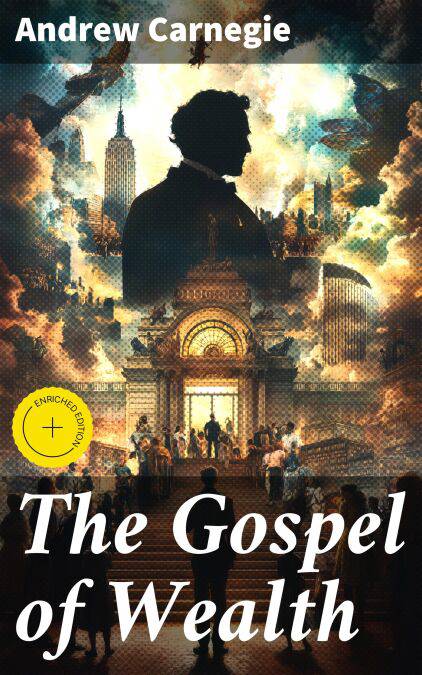
- Retrait gratuit dans votre magasin Club
- 7.000.000 titres dans notre catalogue
- Payer en toute sécurité
- Toujours un magasin près de chez vous
- Retrait gratuit dans votre magasin Club
- 7.000.0000 titres dans notre catalogue
- Payer en toute sécurité
- Toujours un magasin près de chez vous
The Gospel of Wealth EBOOK
Enriched edition. A Call to Action for Responsible Wealth Distribution
Andrew Carnegie
Ebook | Anglais
1,99 €
+ 1 points
Format
Description
Andrew Carnegie's "The Gospel of Wealth" is a profound exploration of the responsibilities of the affluent in society, advocating for philanthropy as a moral obligation. Written during the Gilded Age, Carnegie's work uses a persuasive and didactic style to argue that the wealthy should actively contribute to the betterment of society. He eloquently proposes that surplus wealth is best utilized when it is dispensed in ways that promote the common good, like funding libraries, education, and public institutions, rather than through bequests after one's death. Andrew Carnegie, a self-made steel magnate, rose from humble beginnings to become one of the richest individuals of his time. Growing up in a poor Scottish family, he understood socioeconomic struggles intimately. His experiences galvanized him to advocate for the idea of the "American Dream" and the concept that wealth should be a tool for societal progress, the cornerstone of his philanthropic philosophy. "The Gospel of Wealth" is essential reading for anyone interested in economic disparity, philanthropy, and the moral implications of wealth. Carnegie's insights remain relevant today as discussions about the role of the wealthy in society continue, making this text indispensable for scholars and engaged citizens alike.
In this enriched edition, we have carefully created added value for your reading experience:
- A succinct Introduction situates the work's timeless appeal and themes.
- The Synopsis outlines the central plot, highlighting key developments without spoiling critical twists.
- A detailed Historical Context immerses you in the era's events and influences that shaped the writing.
- An Author Biography reveals milestones in the author's life, illuminating the personal insights behind the text.
- A thorough Analysis dissects symbols, motifs, and character arcs to unearth underlying meanings.
- Reflection questions prompt you to engage personally with the work's messages, connecting them to modern life.
- Hand‐picked Memorable Quotes shine a spotlight on moments of literary brilliance.
- Interactive footnotes clarify unusual references, historical allusions, and archaic phrases for an effortless, more informed read.
In this enriched edition, we have carefully created added value for your reading experience:
- A succinct Introduction situates the work's timeless appeal and themes.
- The Synopsis outlines the central plot, highlighting key developments without spoiling critical twists.
- A detailed Historical Context immerses you in the era's events and influences that shaped the writing.
- An Author Biography reveals milestones in the author's life, illuminating the personal insights behind the text.
- A thorough Analysis dissects symbols, motifs, and character arcs to unearth underlying meanings.
- Reflection questions prompt you to engage personally with the work's messages, connecting them to modern life.
- Hand‐picked Memorable Quotes shine a spotlight on moments of literary brilliance.
- Interactive footnotes clarify unusual references, historical allusions, and archaic phrases for an effortless, more informed read.
Spécifications
Parties prenantes
- Auteur(s) :
- Editeur:
Contenu
- Nombre de pages :
- 29
- Langue:
- Anglais
Caractéristiques
- EAN:
- 4064066407681
- Date de parution :
- 07-12-20
- Format:
- Ebook
- Protection digitale:
- Digital watermarking
- Format numérique:
- ePub

Les avis
Nous publions uniquement les avis qui respectent les conditions requises. Consultez nos conditions pour les avis.






